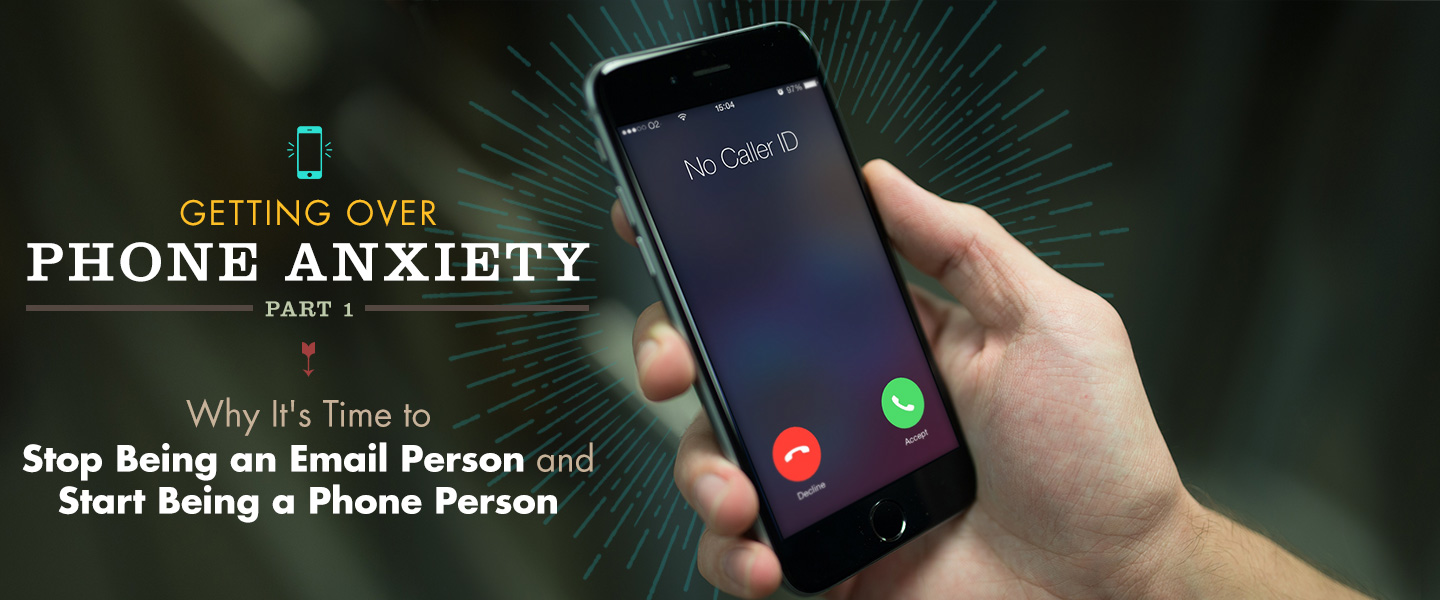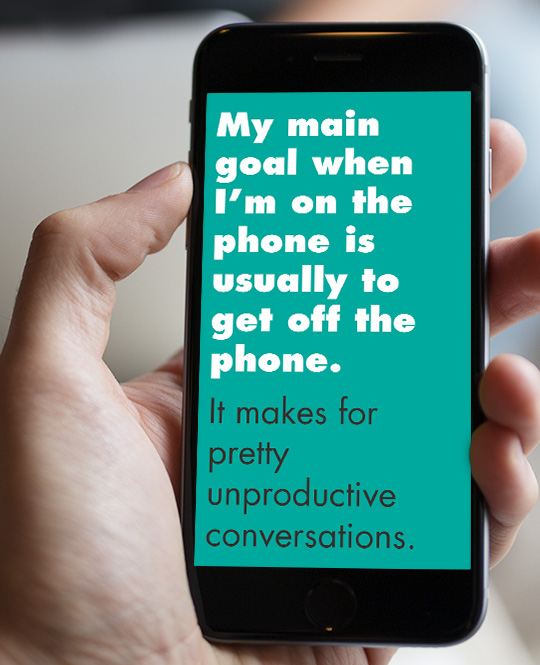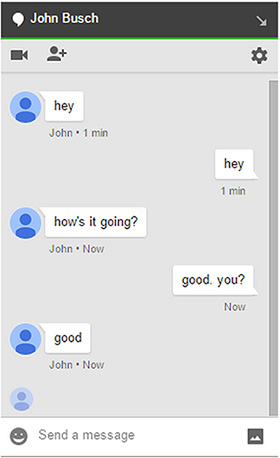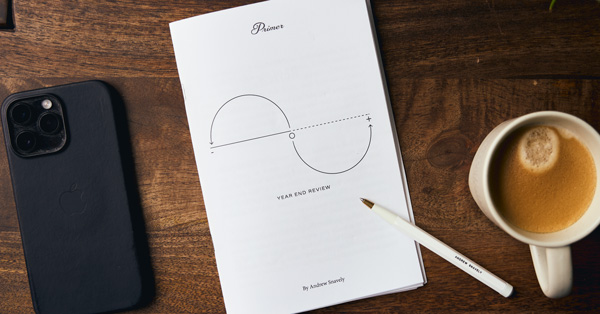This is Part 1 in our series on destroying your phone phobia.
➳ Part 1: Why It’s Time to Stop Being an Email Person and Start Being a Phone Person
➳ Part 2: Introversion is No Excuse for Awkward Phone Calls
➳ Part 3: The Millennial’s Guide to Talking on the Phone – The 10 Essentials
This year, I’ve been working on a sort of personal experiment. I’ve made the decision to talk on the phone as much as possible. My goal is to talk to as many new people over the phone as I can. I’m not doing this because I am incredibly gregarious and love talking on the phone. In fact, it’s quite the opposite. I am incredibly introverted and I hate talking on the phone. So, it’s not that I want to be doing this. It’s that I have to.
Like many people my age, I am not particularly skilled on the phone. You might say that I’m downright awkward. Part of that is a generational thing. I was born in the 1980s, which makes me the M-word: that peculiar generation that came of age at the same time as chat, instant messaging, and SMS. In fact, we are the ones who made these the norm. Digital asynchronous communication is the Millennial’s native tongue.
For most of my life, my preference for digital communication has informed my narrow view of the phone. I eschewed the phone categorically, lumping it together with the likes of fax machines and pagers; they are simply inferior technologies that have been replaced with better, more efficient tools.
The Oatmeal sums it up better than anyone can in 10 reasons to avoid talking on the phone (for me, #9 is the worst). Simply put, we all came to an agreement that the phone is clunky, awkward, and often a waste of time.
But lately, I’ve been questioning that notion.
All the advances in mobile technology and social media innovation seem to be transitioning us away from the phone, replacing it with better, faster ways to get what we want from the world and the people in it. With apps like Uber, Amazon, LinkedIn, Facebook, GrubHub, and Gmail, it seems like you could get by without ever using the phone again. And truly, you probably can.
The problem with these slick, efficient tools is that they are fine instruments, engineered for very specific tasks. They allow me to like and propagate memes, order pizza, and cyberstalk my former classmates with unprecedented ease. By doing these things so effortlessly, you shortcut around certain aspects of human interaction. I didn’t think I’d ever miss these. I don’t know what changed about me, but now I do miss them.
Let me try to explain.
The Human-Machine-Human Interface
I’ve always been a little bit socially anxious. As a kindergartner, I remember running away from the soccer field in a panic at halftime. When my dad finally caught me in the parking lot, I told him: “Everyone is looking at me!” This discomfort with being in the spotlight—be it in front of one person or one hundred people—stayed with me throughout high school. It wasn’t that I disliked people. I wasn’t mentally ill or emotionally wounded. I had the same deep longing for human connection as anyone else. I simply lacked the confidence to reach through that void of awkwardness and make the connection.
Thanks to the internet, I never had to gain that confidence. I was in middle school when my mom installed our state-of-the-art 28.8k modem and it changed my life. It replaced something I was uncomfortable with—face-to-face interaction—with something I was extremely comfortable with: computer interaction. I got my ICQ UIN, 3742829, when I was a teenager and it only got better from there. The human-machine-human interface was a magical paradox. It allowed me to be completely solitary but also social. It allowed me to talk to anyone. Even girls. Especially girls. What a miracle!
As a kid without a driver’s license and an infinite well of free time, instant messaging was groundbreaking technology. It was fantastic for interacting with other denizens of the internet—that subculture of young people who felt comfortable sharing themselves deeply over a dialup modem long into the night. You can learn a lot about a complete stranger over the course of 1,000 messages. But now that I’m older and busier, and everyone else is too, I’m starting to feel the limitations of the medium.
Text is Slow and So am I
Email is my comfort zone. In-person meetings are okay for me, too, as long as I get more than a few minutes to get comfortable. The phone? I absolutely hate it. I am extremely underwhelming on the phone. I stutter, I misspeak, I cut people off, I mishear people and pretend I didn’t—the whole thing is usually a train wreck. My main goal when I’m on the phone is usually to get off the phone. It makes for pretty unproductive conversations.
It’s clear to me that this isn’t a good thing. All the time, I feel this untraversable distance between me and the people I try to talk to on the phone. It’s like I am speaking a different language.
So, I’ve spent the last few months examining the reasons why the phone isn’t working for me, and I think I’ve uncovered it. It’s not the reason I expected:
I’m slow.
When it comes to sending and receiving the accurate and genuine information in human-to-human voice conversations, I am slow. I am fast with technology. I am fast when I write articles, emails, and chat messages. But I am slow when it comes to connecting with people in real time. This doesn’t mean that I’m unable to do it. Like I said, I do not have any type of social disorder. I can connect with people and I like doing it. But it just takes me longer to do it. This is a huge disadvantage to me because the world is moving faster and faster. And that’s why the phone is more important than ever. The phone is fast.
We usually think of texting, chatting, and emailing as faster modes of communication. We call them “instant” messaging and compared to voicemail and “snail mail,” they are indeed instantaneous. But removed from a technological standpoint, exchanging lines of digital text with another human being to convey feelings and information is a painfully slow way to communicate. Unless you are writing elegant poetry to an astute literary reader, there’s an inherent lack of depth to bare text.
Compared to typed text, the spoken word has incredible word economy. You simply don’t have to say as much when you actually talk to someone in order to get your thoughts and feelings across. We human beings are hardwired by nature to intuit the feelings, intentions, and emotions of other human beings. The amount we glean from each other through mere eye contact is testament to the magic of real time human interaction. There is vastly more “data” about someone’s thoughts and feelings being transmitted when you engage them in-person or on the phone rather than via text.
For me, that’s a tad overwhelming. I feel like I lack the processing power to read all that data in real time. This is what I mean when I say I’m slow. In group conversations, I feel like I’m always a few steps behind everyone else. This is why my preferred method of contact has always been email. Email and chat are turn-based modes of communication. You say something, then you wait for me to say something. I craft a response, then I wait for you to read my response and craft yours. There’s a built-in pause button and it lets the dust settle in my head before I say the next thing.
On the phone, it’s different. I get that feeling I got when I was six years old, playing soccer: “Everyone is looking at me.” I know that phone calls are brief—many last less than a minute, and I can feel the clock ticking as the other party waits expectantly for me to impress them. It’s too little time, and I always hang up the phone feeling like I never got to say what I meant to say. Or maybe I did say it, but it was so buried in uncertainty that it doesn’t matter.
I’m starting to feel that void again.
But unlike in high school, when the void was standing between me and personal connections, now, it’s standing between me and professional connections, too. It’s standing between me and my family, my old friends, and new friends, too. And now, the human-machine-human interface will only get me so far.
I need to learn to keep up with the fast world.
The Phone is Trending Up
Compared to hearing someone's actual voice and all the subliminal information it conveys, digital text-based communication is a low bandwidth form of connecting to people. I made deep and lasting friendships on the internet, but this is because I had the time. If you spend eight hours a day exchanging thousands of messages with one person over the course of four years, then you do eventually reach the same level of connection as you would from a few face-to-face meetings or phone conversations.
But ain’t nobody got time for that.
I am serious about getting better on the phone. That's why I've been calling up strangers and talking to them. Some of the strangers I've been calling are actual experts on the subjects. And they agree that even in this age of digital communication, the phone is more important than ever.
Dana Manciagli is someone who makes her living helping others further their career through effective communication. A big part of this is teaching people how to pick up the phone and use it effectively. I call her and ask her if she thinks phone skills are still relevant.
Her answer is an emphatic “yes.”
Dana spent over 30 years of her life as a corporate executive, working for companies like Kodak, IBM, and most recently, Microsoft. She’s worked with a tech startup from the early stages to IPO. Today, she’s a nationally-syndicated business journal columnist, keynote speaker, career coach, and author of Cut the Crap, Get a Job! A New Job Search Process for a New Era. She’s coached, interviewed, and hired thousands of job seekers over the past three decades, which gives her both a broad and deep perspective on how people connect nowadays.
“The phone is trending up,” she tells me without hesitation.
If you had asked me in 2005 what I hoped the future would be like, it would not involve talking on the phone more than ever. Just like the Jetsons eating 3 square meals a day in pill form, I would have preferred everything to be condensed into a highly efficient, one-gulp experience. You upload your profile to the internet, some robots fact-check your resume, and then a headhunter logs on to LinkedIn and clicks the “Hire” button next to your profile picture.
Clearly, though, we’re not there yet. In fact, we’re going the opposite direction.
Take job interviews for instance. A critical part of the vetting process has always been the phone screen. This is when the potential employer goes beyond who you are on paper and starts poking at who you are as a human being. Many consider this a formality of the hiring process—an administrative first step prior to the in-person interview. But more and more, it’s not a formality. In many ways, it’s more critical than the in-person interview.
Dana explains to me why employers are relying on the phone more than ever. There are a few key reasons:
Travel costs. The practice of flying candidates out for interviews just to see if they are qualified doesn’t make sense anymore. Maybe it never did. Oftentimes, the on-site interview is more to show you the company and convince you it’s a place you’ll be happy working. Smart employers will have already made up their minds about whether or not you’re qualified before this point. It’s far cheaper and faster to schedule phone or video interviews, and that’s what recruiters rely on these days. If you’re like me, and you’re at your best over the course of an hour long or more face-to-face meeting versus a 15 minute phone conversation, this can be a huge disadvantage.
Globalization. More and more, your clients, coworkers, and perhaps even your higher-ups may hail from a different country. Skype, VoIP, and web conferencing make it more feasible to replicate real-time face-to-face or voice-to-voice conversations with these important contacts. Expect these technologically-assisted real-time meetings to occur frequently. Non-native English speakers will prefer talking on the phone over typing out an email. Plus, the lack of day-to-day interaction will make connecting over the phone even more important.
Generational diversity. Gen Yers are flooding the workplace, but it’s still mostly Baby Boomers in the corner offices. Generally speaking, Baby Boomers (and even many Gen Xers) prefer a phone call or voicemail over an email. It’s not unusual for them to follow up an important email with a phone call, even if it’s just to say, “Hey, sent you a message, let me know when you’ve seen it.” If you want to succeed professionally, you’ll have to learn to talk to other generations.
Interpersonal deal-breakers. The phone is trending up in the job search field, but also on the job. Getting you on the phone is a way for employers to take your interpersonal skills for a test drive. They get to see if you are well-prepared, professional, and nimble on your feet in a real-time phone conversation. It’s easy to craft and hone a killer cover letter (or pay someone to do it for you), but it’s harder to fake overall smarts and communication skills on the phone. When a potential employer calls you, they are checking for any warning signs about your professional demeanor on the phone. If you flub the phone screen, you just might rule yourself out from the next step. (Dana Manciagli gave me this point, but I lifted the term “interpersonal deal-breakers” from Alison Green’s Ask a Manager blog.)
Professional vs. Personal. These points highlight why phone calls are more important than ever in the business world. It’s also true for your personal life. Just as businesses were the first to embrace email, the opposite pendulum swing back towards real-time voice interactions is reflected first in the workplace. Businesses found out that a phone call is the weapon of choice when time is of the essence and the stakes are high. Likewise, when you need to reach out on a personal level, the phone works better. When you need to bribe an in-law to help you move a piano last minute, or reach out to a city official to complain about a life-ruining pothole, or clear the air with an estranged buddy, or find a listening ear when you are at the end of your rope and considering suicide, you pick up the phone. Texting, emailing, or penning a letter won’t yield the level of connection and immediacy of response that you need.
We Don't Trust Machines
I want to make one last point before I wrap up part 1. I keep talking about how the phone is a shortcut to understanding someone on a human level. But it's more than that. We as humans have a deeply ingrained mistrust of machines. Or maybe it's not a mistrust as much as it is an inability to extend good faith to something inhuman. It certainly can't reciprocate, for one.
When you try to connect via the human-machine-human interface, you are crippling your ability to make a meaningful human connection. You can only get so far in any pursuit without stepping out from behind the curtain.
I understand this now, and I hope you do, too. And that's the first part of the challenge. The next part is what to do after you make the decision to engage with people directly.
For me, I sort of don't know. I've been hiding behind my screens for as long as I can remember. And that's a big reason for my social slowness. I know that it is better to connect on the phone than in email, but I get so anxious and awkward when I try that I often do more damage than good. I know the best tool to use, I'm just not very good at using it. In the same way that we often chuckle at our parents for underutilizing technology (printing and faxing screenshots, typing search terms into the status field on Facebook, things like that), I’m sure there are socially competent people who regard me with a certain level of amusement and pity when it comes to interacting by phone.
Part of me worries that I can't fix this. My formative years are long behind me. What if I am just a computer person through and through now?
I'm going to keep talking on the phone and keep writing articles about it. If you're as invested as I am, I invite you to follow along with me.
In Part 2, I'm going to begin the work of conquering my social awkwardness on the phone. I have another expert lined up for that who I think you’ll really like.
Read Part 2
➳ Part 2: Introversion is No Excuse for Awkward Phone Calls
➳ Part 3: The Millennial’s Guide to Talking on the Phone – The 10 Essentials














![It’s Time to Begin Again: 3 Uncomfortable Frameworks That Will Make Your New Year More Meaningful [Audio Essay + Article]](https://www.primermagazine.com/wp-content/uploads/2025/01/begin_again_feature.jpg)



